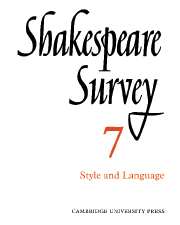Book contents
- Frontmatter
- Fifty Years of the Criticism of Shakespeare’s Style: A Retrospect
- Shakespeare and Elizabethan English
- The Poet and the Player
- Shakespeare’s Orthography in Venus and Adonis and Some Early Quartos
- The New Way with Shakespeare’s Texts: An Introduction for Lay Readers. I. The Foundations
- The Red Bull Company and the Importunate Widow
- Vaulting the Rails
- Shakespeare and the Acting of Edward Alleyn
- The Birmingham Shakespeare Memorial Library
- Shakespeare’s Italy
- International Notes
- Shakespeare Productions in the United Kingdom: 1952
- Acting Shakespeare: Modern Tendencies in Playing and Production
- The Year's Contributions to Shakespearian Study 1 Critical Studies
- 2 Shakespeare’s Life, Times and Stage
- 3 Textual Studies
- Books Received
- Index
- Plate Section
3 - Textual Studies
Published online by Cambridge University Press: 28 March 2007
- Frontmatter
- Fifty Years of the Criticism of Shakespeare’s Style: A Retrospect
- Shakespeare and Elizabethan English
- The Poet and the Player
- Shakespeare’s Orthography in Venus and Adonis and Some Early Quartos
- The New Way with Shakespeare’s Texts: An Introduction for Lay Readers. I. The Foundations
- The Red Bull Company and the Importunate Widow
- Vaulting the Rails
- Shakespeare and the Acting of Edward Alleyn
- The Birmingham Shakespeare Memorial Library
- Shakespeare’s Italy
- International Notes
- Shakespeare Productions in the United Kingdom: 1952
- Acting Shakespeare: Modern Tendencies in Playing and Production
- The Year's Contributions to Shakespearian Study 1 Critical Studies
- 2 Shakespeare’s Life, Times and Stage
- 3 Textual Studies
- Books Received
- Index
- Plate Section
Summary
This has been a notable year in textual studies; perhaps later generations will call it revolutionary. When has scholarly tradition been called so sharply in question as in F. P. Wilson’s lecture, ‘Marlowe and Shakespeare’? “Was it Shakespeare and Marlowe”, he inquires, “who first gave dignity and coherence to the historical play and raised it above the level of a chronicle? So we have always been taught to believe; but when we look for these early chronicle plays written before the Armada, where are they? . . . Many play-titles have survived [from the 1580’s], and a few plays, and if we go by these we are forced into this surprising conclusion: that there is no certain evidence that any popular dramatist before Shakespeare wrote a play based on English history.” And after dismissing the pretensions of The Famous Victories of Henry the Fifth and several of its ilk, he continues: “My conclusion is, though I am frightened at my own temerity in saying so, that for all we know there were no popular plays on English history before the Armada and that Shakespeare may have been the first to write one.” This is heady wine of a new orthodoxy with which to fortify oneself before venturing into the mazes of collaboration and revision that are detailed in the plays recently edited by John Dover Wilson.
- Type
- Chapter
- Information
- Shakespeare Survey , pp. 147 - 153Publisher: Cambridge University PressPrint publication year: 1954

